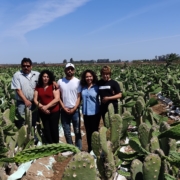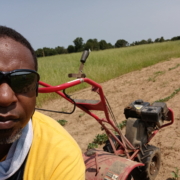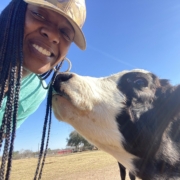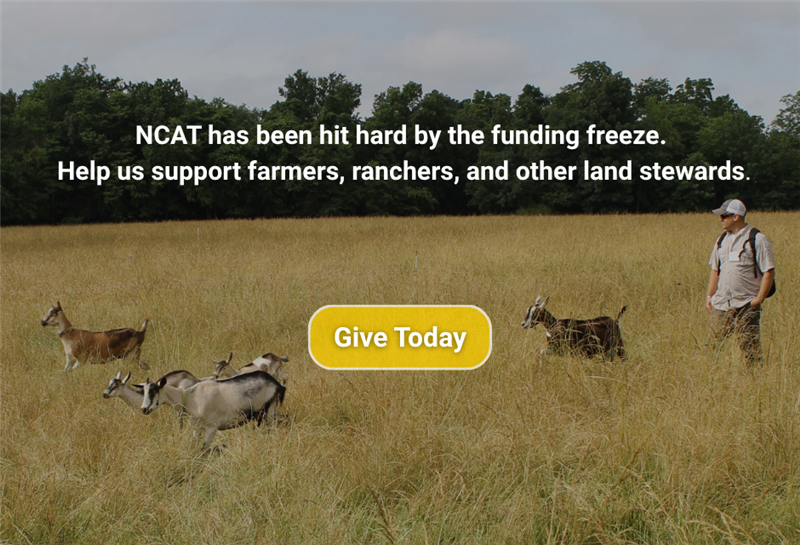Jason Puryear
Jason Puryear of Meadville, Pennsylvania, got his start in the food world through the restaurant industry. As relationships with the farmers in his area began to grow, and the number of small farmers started to dwindle, the idea of producing vegetables started to take hold. Eventually, Jason began attending farmer training programs and it was through one of those experiences hosted by the National Center for Appropriate Technology that Jason met another prospective farmer with whom he was able to develop a partnership. Jason’s farm partner had excess land and the desire to develop it into a working farm. With similar goals in mind, such as the desire to produce sustainably and in concert with the surrounding environment, they set off to break ground and begin their farming journeys together.
While the farm is currently in its fourth year, they have been producing for market over the past two years. The first two years were spent preparing the site, setting up beds, amending the soil, building infrastructure, and planting an assortment of experimental crops. Jason chooses to farm organically but doesn’t have organic certification, since he can’t afford its cost. They have also been able to innovate in several ways. The farmers practice no-till and plant some of their product in raised beds. High tunnels, low tunnels, and green houses are also on the property.
This year, Jason hopes to expand production. Currently, he primarily grows garlic, 22 varieties in all— but also grows a wide variety of niche crops, including turmeric, ginger, and lemongrass, among many others. There is a woodland on the property where ginseng and ramps have been planted. In the coming year, they would like to include wildflowers to serve as habitat for an apiary.
Given Jason’s skills in the kitchen and his access to a commercial kitchen, he dedicates most of his time to a catering business that also serves to add value to the crops produced on the farm. In addition to marketing through the catering business, he sells through two farmers markets and local grocery stores. While Jason prioritizes his efforts on the catering side, his partner works the farm full-time. Having this partnership has given the farm a greater capacity to overcome challenges. When Jason was unable to be at the farm due to COVID restrictions, his farm partner was able to take up the slack and continue with the day-to-day.
While Jason divides his professional endeavors between catering and farming, he also dedicates time to community building and supporting organizations that he has benefited from. The farmers maintain low prices, even though the quality of their product is high, so that all people can access healthy sustainably produced vegetables. Jason likes to connect to the community through his love of teaching about farming and cooking. He started a group called Farm, Talk, and Tasting to share food and stories with members of the community and other farmers. The most valuable resource that Jason has been able to access is the other farmers in the area. Every year, he hosts a fundraiser for the organizations that have helped him during his farming career. In recent years, he has raised money for the Food Bank, Soul Fire Farms, and the National Center for Appropriate Technology.
The rural nature of his lifestyle in Pennsylvania makes being a farmer of color something of a challenge. He finds it frustrating to not be taken seriously and needing to prove himself when speaking to other farmers. Due in part to this reality, Jason has developed his product mix and marketed his products with the minority population in mind. He finds that there are many crops that are passed over by his clients and he likes to introduce people to those vegetables through his cooking.
Jason observed that general access to farmer-facing organizations and personnel tends to be lacking. He commented on the difficulty of setting meetings with the local NRCS office and the clunky nature of securing and receiving funding from the government. He hopes to see more solidarity among those organizations that support farmers and believes there should be more support for and acknowledgment of farmers of color. Size, crop, product, skin color, etc. should have no impact on the support given. He also sees a great need for more organizations to focus on local farmers as opposed to the larger, national organizations that are more common.
Funding for equipment and projects is a big challenge for Jason. He would like to be able to innovate more but finds that accessing programs through bureaucratic channels to be a clunky and time-consuming process. That said, he has no plans to stop innovating. In the coming years, he hopes to add more greenhouses and hoop houses in order to produce more crops in the colder seasons, and to improve flooring in the barn and other buildings to increase agrotourism at the farm.
Jason measures his success by his ability to give back to his community and to support his cooking business. Eventually, he hopes to be able to eliminate the need for the catering business and dedicate himself fully to farming.









![thumbnail_ed-hunt[1] Ed Hunt](https://attra.ncat.org/wp-content/uploads/2022/08/thumbnail_ed-hunt1-180x180.jpg)


